-
Notifications
You must be signed in to change notification settings - Fork 504
WorkShop08
A workshop on volunteer computing, distributed thinking, and BOINC will be held 11-12 September 2008 in Grenoble, France. It is being hosted by the MESCAL team of INRIA, and supported by IBM. The general organizers are Derrick Kondo (INRIA) and David Anderson (UCB). The local organizers are Carlos Barrios-Hernández (LIG), Daniele Herzog (INRIA), Annie Hsu, and Arnaud Legrand (CNRS).
The workshop follows the First, Second and Third BOINC Workshops.
The objective of this workshop is to share information about BOINC and projects using it, through short presentations and informal discussions, in a relaxed, open and friendly atmosphere. The workshop aims to stimulate new developments and activities related to volunteer computing and distributed thinking, by allowing users to share their experience and requirements, giving developers the opportunity to outline their plans, and stimulating new collaborations between participants.
09/11: A personal summary of a volunteer attendee. See blog.os-tools.net
09/17: Workshop presentations are available.
Anyone who is actively involved with volunteer computing is encouraged to attend. This includes:
- People operating volunteer computing and/or distributed thinking projects;
- Computer scientists interested in research involving BOINC;
- People active in developing and maintaining BOINC software;
- People interested in deploying BOINC within and across organizations.
The workshop is free but attendance is limited. If you are interested in attending, or have any questions, please [David Anderson|k=01o5RAw95mV48kf6x-NVERig==&c=RSUgx-KG3aii0O1aEHoRwV0obvhd9SciJkpE21FkRJ0=)](T(MailHide|email).
The workshop will be held at the INRIA Grenoble Rhône-Alpes Research Center. (See Agenda for exact the room.) This center is located about 10km northeast of Grenoble in the research park of Montbonnot. The address is:
INRIA Grenoble - Rhône-Alpes
Inovallée
655 Avenue de l'Europe
Montbonnot - Saint Martin
38334 Saint Ismier Cedex
Directions for getting there are below. A Google map is here.
-
10 Sept (optional), Conference room F107. Tutorial and hands-on help session. A tentative agenda follows. If you're interested in other topics, please inform the organizers.
- 9:00-10:00 Quick start: distributed computing in one hour or less (Anderson). How to use the BOINC Virtual Server and the single-job submission system to get a project up and running quickly.
- 10:00-11:00: Building and debugging BOINC applications (Walton). How to build BOINC applications for different platforms (Windows, Linux, Mac) and how to debug applications "in the field".
- 11:00-12:00: Customizing your BOINC server (Reed). Learn about server configurations options that can greatly increase your project's throughput. View Presentation (PDF)
- 13:30-15:30: Tutorials on Bolt and Bossa (Anderson). Learn about newly-developed tools that let you educate your volunteer base, and use their brains (as well their PCs) to help your research.
- 15:30-17:30: Questions and hands-on help.
-
11 Sept, Grand Amphitheater.
- 8:30-9:00: Coffee and light breakfast
- 9:00-11:30: Short opening remarks, followed by talks by attendees. Attendees are encouraged to give talks summarizing their project status, goals, and technical issues and requirements (15-20 minutes; a video projector will be available).
- 11:30-13:00: lunch (INRIA cafeteria)
- 13:00-15:00: More talks
- 15:00-15:30: coffee break
- 15:30-17:30: More talks
- 19:00: Workshop dinner
-
12 Sept, Grand Amphitheater.
- 8:30-9:00: Coffee and light breakfast
- 9:00-11:00: Status and plans of the BOINC project.
- 11:00-11:30: Formation of BOF topics and groups
- 11:30-13:00: lunch (INRIA cafeteria)
- 13:00-14:00: Parallel meetings of BOF groups.
- 14:00-15:00: Parallel meetings of BOF groups.
- 15:00-15:30: coffee break
- 15:30-17:30: Summaries of BOF group discussions, and general discussion.
-
13 Sept (optional)
- Alpine hiking
The workshop and tutorials will be videotaped, and the talks will be available online after the workshop.
9:00 to 11:30:
| Kevin Reed | World Community Grid |
| Marc Garbey | Volunteer computing for ecology: the Virtual Prairie BOINC project |
| Bruce Allen | Future directions for Einstein@home |
| Alejandro Rivera | Ibercivis: status, configuration, and expectations |
| Jack Shultz | Modeling biological hydrogen production |
| Ana Gago Da Silva | The AfricaMap Project and CCC |
| Ben Segal | Status and future of LHC@home |
13:00 to 15:00:
| Matt Blumberg | GridRepublic status report |
| John Hallissey | Marketing and promoting BOINC and the projects |
| Andrew Gillette | The Invisible Hand and Hidden Markets of the BOINC Community Platform |
| Peter Kacsuk | EDGeS: integrating BOINC-based DGs with EGEE |
| Gabor Gombas | Security issues in hierarchically connected BOINC systems |
| Jozsef Kovacs | BOINC extensions in the SZTAKI Desktop Grid system |
15:30 to 17:30:
| Derrick Kondo | Ensuring Collective Availability in Volatile Resource Pools via Forecasting |
| Daniel Lombraña González | Extending BOINC by means of virtualization |
| Paco de Vega | An organizational grid management system for BOINC |
| Jaspal Subhlok | Inter-task communication on volatile nodes |
| Carlos Varela | Enabling synchronous computations on volunteer computing environments |
| Oded Ben-Dov | BOINC goes Mobile |
Possible discussion topics (feel free to append):
-
Use of VM technology for apps
-
Synchronous and communicating apps
-
Social networks, publicity, teams, recruitment
-
Distributed thinking and education
-
System research issues: performance, scheduling, security
-
BOINC and Grids
-
How to improve BOINC documentation
-
Multithreaded and coprocessor apps
-
Use of mobile devices (cell phones, PDAs, media players)
-
Alternatives to MySQL
-
Scheduler: handling diverse workloads; HR
-
Simplify app dev, the wrapper, master/worker, etc.
-
Apps in Java, Python, Lisp
-
Web features; Preferences system (including project specific settings)
-
How to keep server software up to date; other project management issues
-
Security
-
Credit: normalization, generalization
-
Data distribution (via bittorrent)
Thus, the stream (webcast) will be cut between each speaker. If you view the webcast live you will need to attempt to reattach several times after each speaker until the stream can be reopened. Many thanks to Arnaud Legrand for making this possible.
The dinner will be held at Grenoble's bastille:
Quai Stéphane Jay, 38000 Grenoble
at 19:00 on September 11.
Thanks to IBM, the reduced dinner cost will be about 9 euros and 4 euros for the round-trip cable car ride.
The closest airports to Grenoble are Grenoble-Saint-Geoirs Airport (GNB), Lyon Saint-Exupéry Airport (LYS), and Geneva International Airport (GVA). There are shuttles and trains that take you from the airport to Gare Routiere/Grenoble's central train station. From there you can take local public transport to your final destination.
FROM Lyon Saint-Exupéry Airport (LYS):
(old name Lyon Satolas Airport, but same place)
Take the Satobus airport bus shuttle to Grenoble. It's 30€ for a round-trip ticket. Travel time from LYS to Grenoble's Gare Routière is about an hour and the bus departs every hour from 6:30am to 11:30pm except Sundays when it the first bus leaves at 7:30am. Bus back to the airport departs every hour on the hour from Gare Routière 5am-9pm (except Sundays when the first bus leaves at 6am).
FROM Grenoble-Saint-Geoirs Airport (GNB):
Most flights to GNB are from London. You can take the Transisere airport bus to Grenoble's central train station/regional bus station. The cost is 4€ each way and you pay for your ticket on the bus. The schedule of the bus usually corresponds to scheduled flights.
FROM Geneva International Airport (GVA):
There are two possible methods of transport from GVA. By BUS, you can take the Aerobus from the airport to Grenoble's Gare Routière. The Aerobus departs 11am, 2:30pm and 7:30pm from the airport and takes about 2.5 hours to reach Grenoble. The cost is 69€ round trip or 43€ one way.
By TRAIN, you can use the SNCF TER train from the airport to Grenoble. The train departs 9:47am, 1:47pm, 3:47pm, and 5:47pm. It takes about 2.5 hours to reach Grenoble. A round trip ticket is about 54€ or 88 CHF.
Weather
Likely to be warm (~80F/27C), and sometimes wet. So pack an umbrella.
TAG serves as the local transport for Grenoble. INRIA is outside of the Grenoble area and therefore uses Transisère (the regional bus). From the central train station in Grenoble and the Gare Routière, if your hotel is in the city center area, you can take the tram. Trams and buses use the same ticket at 1.40€ for an hour ride. You must validate your ticket at the tram platform or on the bus every time (including transfers). There is a TAG ticket office outside the train station on the way to the tram stop. You can buy a carnet of 10 voyages for 11.90 €. A day pass is 3.70€ and a five day pass is 12.90€. Tickets are also available at the tram platform. There is another TAG ticket office in the Tourist Office in city center.
TO INRIA Grenoble Rhône-Alpes Research Center:
By bus/tramway from Grenoble center or Grenoble railway station:
You can take tramway, line B, direction "Gieres - Plaine des Sports". It takes approximately 23 minutes (from Victor Hugo: city center) to reach the campus depending on the traffic. Get off at the station "Bibliothèques Universitaires".You must buy your travel ticket and validate this ticket before entering the tramway from the automatic selling machines at each tramway station.
Exiting from the tramway, you will find the 6070 bus station towards Montbonnot, after you cross the street. (It is also the bus stop for bus 11 and 26 that are both going towards other Universitaire stops.) The 6070 bus operates every hour between the Campus and INRIA. It takes approximately 12 minutes, traffic permitting, to reach INRIA. (AM departures from this stop are at 7:47am, 8:12am, 8:32am, 8:42am, 8:57am, 9:17am, 9:37am.)
Get off at the bus stop named "INRIA", which is exactly in front of INRIA builiding.
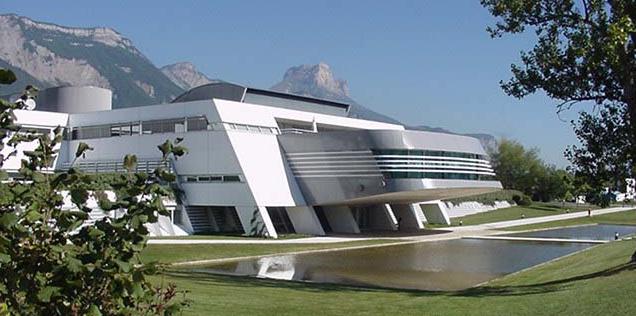
On the transisere.fr site, where it says Numéro de ligne, type in 6070 for the timetable. Usually the 6070 shuttle costs 1.90€ each way. A day pass is 3.80€. But sometimes they let you on for free, if the driver doesn't want to be bothered with change. Just tell them you're going to INRIA and perhaps flash your TAG ticket.
By taxi:
A taxi from downtown Grenoble to INRIA will cost you about 20 euros. It takes about 15-20 minutes to reach INRIA depending on the traffic. Taxi Transialpes : 04 76 71 67 02
A list of hotels can be downloaded here: [hotel_list.pdf]
A google map (from Jack Schultz) of the hotels is here.
HIKE HAS BEEN CANCELED DUE TO RAIN. Instead, we will go to the Caves of Chartreuse (cellars).
Saturday Itinerary: Caves (Cellars) of Chartreuse: 10,bv. Kofler, 38500 Voiron
Open Air Saturday morning market: on rue du Mail between the Hotel de Ville and Eglise Saint-Bruno (over 250 vendors: producers, grocers, manufactured products)
We will take the Voiron Express bus. It stops at Grenoble Gares, which is a bus stop across the street from the Grenoble train station. Round trip is 6€. Arrive early! Don't want to miss this bus!
- 11h46: Voiron Express bus to Voiron
- 12h17: Arrive at Voiron Gare Routière
- 12h20-14h30: Open-Air market, eglise St. Bruno, have lunch
- 14h50-16h20: Tour the Cellars of Chartreuse
- 17h00: Take bus back to Grenoble
- 17h25: Arrive back in Grenoble
IF you need to contact Derrick, cell phone number is 06 78 17 65 89
Total: 65 definite, 6 tentative
- = tentative
Peter Amoako-Yirenkyi (Ghana)
Bruce Allen (MPI, Germany)
David Anderson (UC Berkeley, BOINC, USA)
Eloi Appora-Gnékindy (U. Bangui, Central African Republic)
Christian Beer (Germany)
Oded Ben-Dov (Technion, Israel)
Rémi Bertin (INRIA, France)
Matt Blumberg (GridRepublic, USA)
Oliver Bock (MPI, Germany)
Bill Bovermann (IBM, USA)
Carl Christensen (Stanford University, "Quake Catcher Network", USA)
Emmanuel Deban (Equipe 'France Initiativ', France)
Laurent Debreu (LIG, France)
Frederic Desprez (INRIA, France)
possibly 1 or 2 students as well
Saber Feki (U. of Houston, USA)
Gilles Fedak (INRIA, France)
Marc Garbey (U of Houston, USA)
Yiannis Georgiou (LIG, France)'
Andrew Gillette (TFCLS, USA)
Gabor Gombas (SZTAKI, Hungary)
Daniel Lombraña González (U. of Extremadura, Spain)
Francois Grey (CERN, Switzerland)
*Carmi Grushko (Technion, Israel)
John Hallissey (boincteams.com)
Carlos Barrios-Hernández (LIG, France)
*Jack Harris (USAF, USA)
possible 1 or 2 others also
Marc Honnorat (INRIA, France)
Peter Kacsuk (SZTAKI, Hungary)
Derrick Kondo (INRIA, France)
Jozsef Kovacs (SZTAKI, Hungary)
Janus Kristensen
Peter Lavin (Trinity College, Dublin, Ireland)
Arnaud Legrand (CNRS, France)
Nicolas Maire (U. Basel, Switzerland)
Paul Malécot (INRIA, France)
Bernd Machenschalk (MPI, Germany)
Erick Meneses (LIG, France)
Olha Nahorna (U. Grenoble, France)
Pierre Neyron (INRIA, France)
Lucas Nussbaum (LIG, France)
Fanny Pascual (Pierre & Marie Curie University / LIP6, France)
Juan Antonio Lopez Perez (CERN, Switzerland)
Florence Perronnin (LIG, France)
Carlos Prada (LIG / INRIA Mescal, France)
Reinhard Prix (MPI, Germany)
Kevin Reed (IBM, USA)
Francisco Rodríguez Domínguez (CETA-CIEMAT, Spain)
Alejandro Rivero (U. of Zaragoza, Spain)
Jack Shultz (NAS, USA)
*Marc Silberstein (Technion)
Ben Segal (CERN, Switzerland)
Ricardo Da Silva (CERN, Switzerland)
Ana Silva (UnoSAT, CERN, Switzerland)
Malek Smaoui (U. of Houston, USA)
Jaspal Subhlok (U. of Houston, USA)
Milo Thurston (Oxford, England)
Corinne Touati (INRIA, France)
Julius Tuomisto (ORE project, Finland)
Carlos Varela (RPI, USA)
Pedro Velho (LIG, France)
Francisco de Vega (U. of Extremadura, Spain)
Rom Walton (UC Berkeley, BOINC, USA)
Frank Weiler (NASHIP Berlin, Germany)
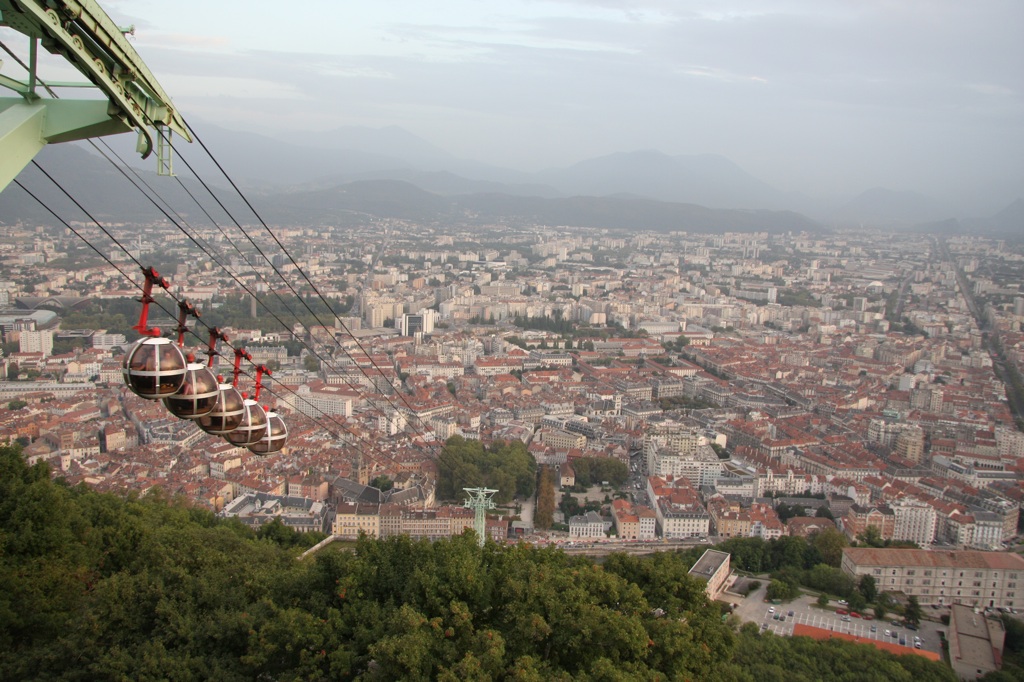
Cable Car in front of Grenoble as seen from Bastille
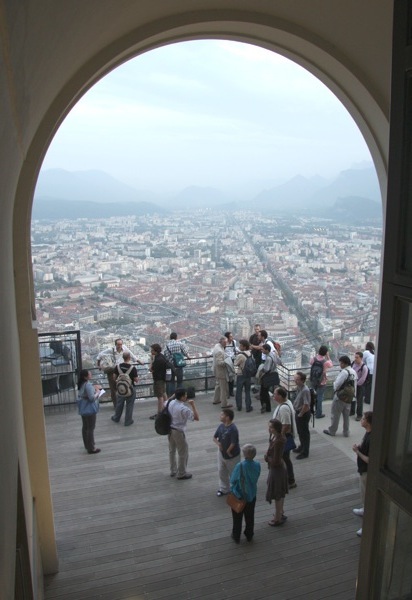
BOINC Workshop participants at Bastille
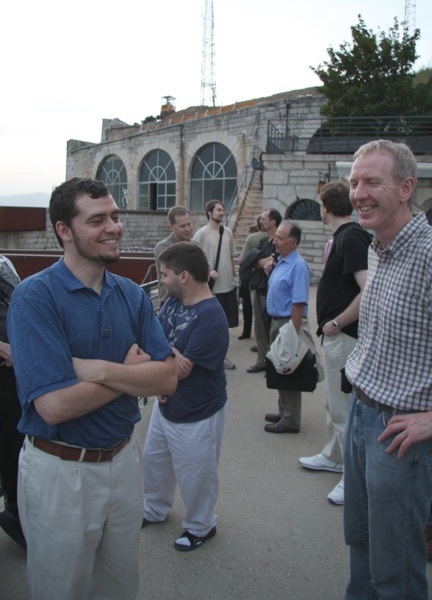
BOINC Workshop participants at Bastille
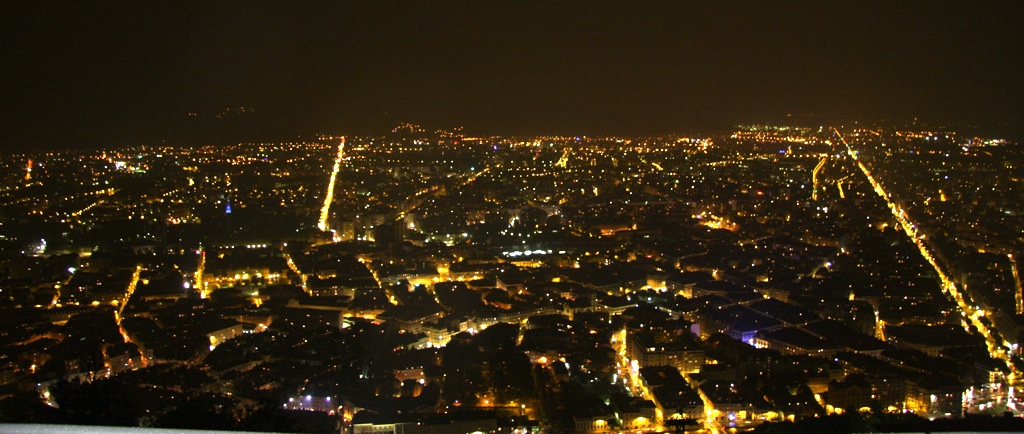
Grenoble at night as seen from Bastille

Group Photo